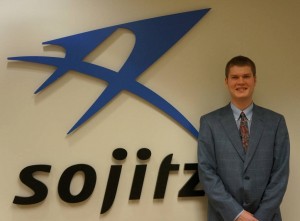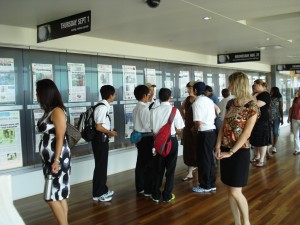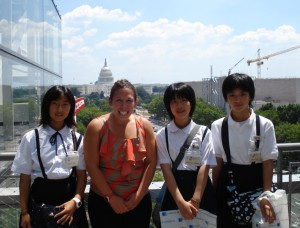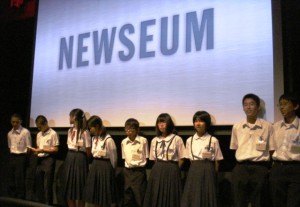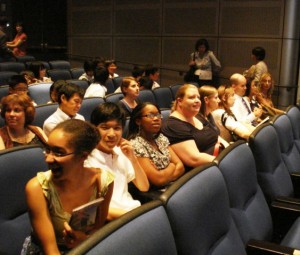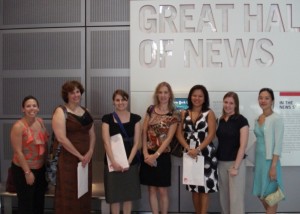
CEPEX collaborated with Florida International University, a dynamic public university in Miami, Florida, for a timely discussion on the global perspectives on the future of nuclear power on October 19, 2011. The event included a distinguished panel of speakers including: Kiichiro Sato, President, JETRO New York; Mark Holt, Energy Policy Specialist, Congressional Research Service; Hon. Eva Alexandra Countess Kendeffy, Consul General of the Federal Republic of Germany; Hon. Gaël de Maisonneuve, Consul General of France; Dr. Jerry Brown, FIU Professor; Dr. Steven Heine, Director, Institute for Asian Studies; Dr. Friedman, Director, EU Center of Excellence and Dr. Joerg Reinhold, Associate Professor, Physics.
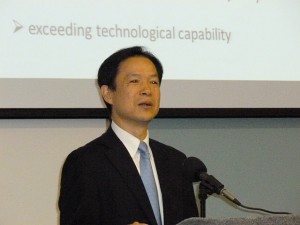
Kiichiro Sato spoke about the effect of the earthquake and tsunami on Fukushima Daiichi, and the ensuing global supply chain repercussions. Despite the major impact of the earthquake and tsunami, Japan swiftly began to rebuild roads, resume shinkansen service, plus rebuild Sendai airport and build temporary houses. Mr. Sato included a comparison of radiation levels in Japan compared with Paris, New York, Moscow, Beijing and London. Despite radiation fears, Japan’s radiation levels in July 2011 were lower than each of the other cities around the world. The rolling blackouts have impacted global supply chains. While Japan had pioneered the “just-in-time” inventory system, now Japan created a “just-in-case” system. Industrial production has recovered to 96% of the pre-earthquake level by August, with uplifting examples such as Renesas working 24/7 and collaboratively to restart production and aid recovery.
Mr. Sato highlighted Japan’s intention to shift towards renewable energy while decreasing the amount of oil in the energy mix. The Noda Government will create new energy and environmental strategies in 2012. Foreign companies are bringing to Japan their smart grid, solar and wind power projects.
To view the presentation: Sato “The Future of Nuclear Power in Post Fukushima”
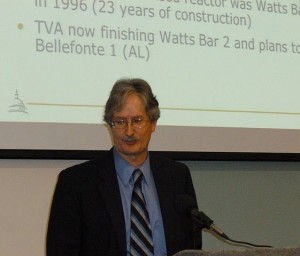
Mark Holt, Energy Policy Specialist at the Congressional Research Service, provided the view of the US nuclear industry after the incident at Fukushima Daiichi. All of the 104 current nuclear reactors were ordered from 1963-1973. 69 are pressurized water reactors (PWR) with 35 boiling water reactors (BWR). Of the BWR, 23 are GE Mark I containments similar to Fukushima Daiichi. The Atomic Energy Act limits operating licenses to 40 years, with unlimited renewals. The oldest operating reactor is in Oyster Creek, NJ and was licensed in 1969.
Post-Fukushima, the US Nuclear Regulatory Commission (NRC) created a task force that issued safety recommendations. The report led to Regulatory Actions and investigation of earthquake vulnerability. Coincidentally, a 5.8 earthquake struck the East Coast in August, close to the North Anna nuclear plant in Virginia. This raised the concern on seismic vulnerability, and both NRC and Congress are focusing on nuclear power plant sites operating near seismic hazards. The Obama administration continues to support nuclear power as part of the clean energy program. Fukushima’s impact led to TEPCO withdrawing from the South Texas project. Other proposed new reactors were already delayed due to economic factors.
To view the presentation: Holt US Nuclear Outlook
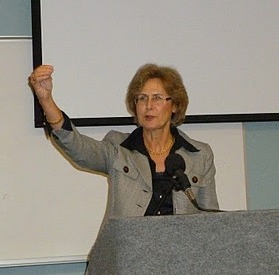
Hon. Eva Countess Kendeffy, Consul General of the Consulate General of the Federal Republic of Germany in Miami spoke frankly about Germany’s plan to end nuclear energy. Germany had 17 nuclear plants and immediately shut down 8 of the older plants after Fukushima. By 2022, all of Germany’s nuclear power plants will be shutdown.
Public opinion in Germany has always been very negative towards nuclear energy, which provides 17% of Germany’s energy. Nuclear was a bridging energy until renewables could take over in 2036, but Fukushima sped up the plans. Renewable energy provided 20.8% of energy in 2011, with plans to reach 35% by 2020. Germans view nuclear power as too risky. Consul General Kendeffy said, “After Chernobyl, Three Mile Island, and Fukushima, it’s impossible to guarantee 100% safety.”
Germany is a leading force in harnessing renewable energy for power generation including wind power, biomass, hydro and solar. Germany’s energy mix in the future will include renewables, gas and coal. In the transition phase, Germany plans to use new technology for carbon-capture storage for the increased coal. Every power customer must pay an additional 3.5 cents/kilowatt hour to promote renewable energy. There are challenges, but Germany is well on the way to increasing renewable energy. President Obama said the nation that leads the clean energy economy will be the nation that leads the global economy. Consul General Kendeffy agrees, and believes Germany will be that nation.
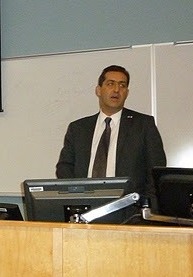
Hon. Gael de Maisonneuve, Consul General at the Consulate of France in Miami discussed the French perspective. France provides an interesting contrast to Germany, with nuclear comprising 80% of their energy mix. France operates 58 nuclear reactors on 19 sites, and is the world’s largest net exporter of electricity. EDF is the state-owned and sole operator of French nuclear power plants, which are all standardized PWR. An EPR, 3rd generation nuclear reactor, is being built in Flamanville in Normandy.
The EU has climate change goals to reduce greenhouse gas emissions, increase renewable energies to 20% of the energy mix by 2020, and decrease by 20% the total amount of energy use by 2020. For France, nuclear energy will assist in reaching the EU goals and remain competitive.
Post-Fukushima, President Sarkozy enacted major initiatives to enhance nuclear safety. Review of all nuclear power installations are being conducted, taking into account lessons learnt from Fukushima regarding earthquakes, loss of power supply and loss of coolants. At the European-level, stress tests of all nuclear installations will be conducted.
Consul General Maisonneuve concluded by quoting former Mohamed El Baradei, IAEA Director, who said in 2005: “We can’t live without nuclear energy which already provides 14% of global power, and it will be 24% in 2050. One and a half billion people have no access to power. And without power, there is no development.”
To view the presentation: Maisonneuve France Nuclear Power


